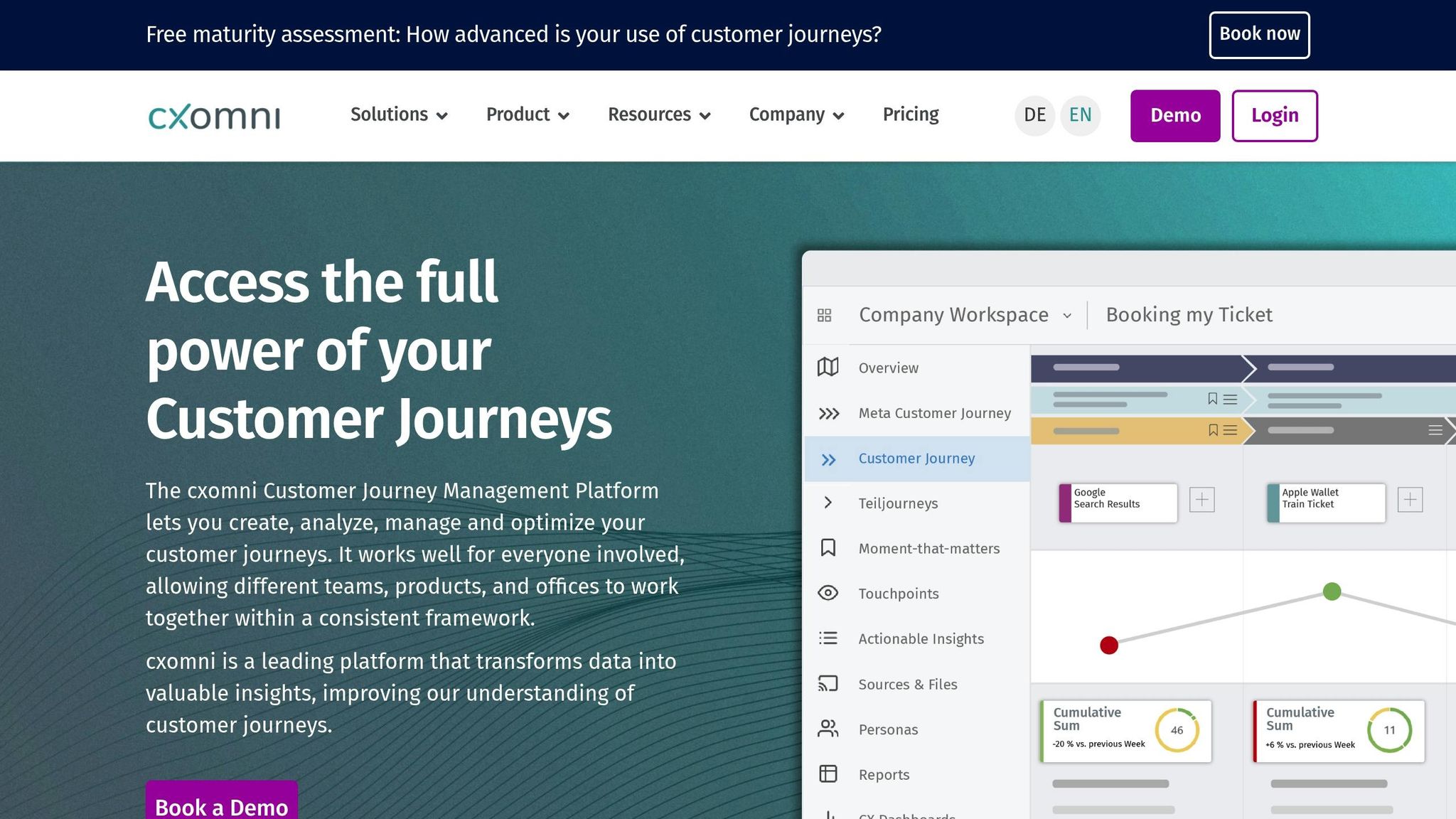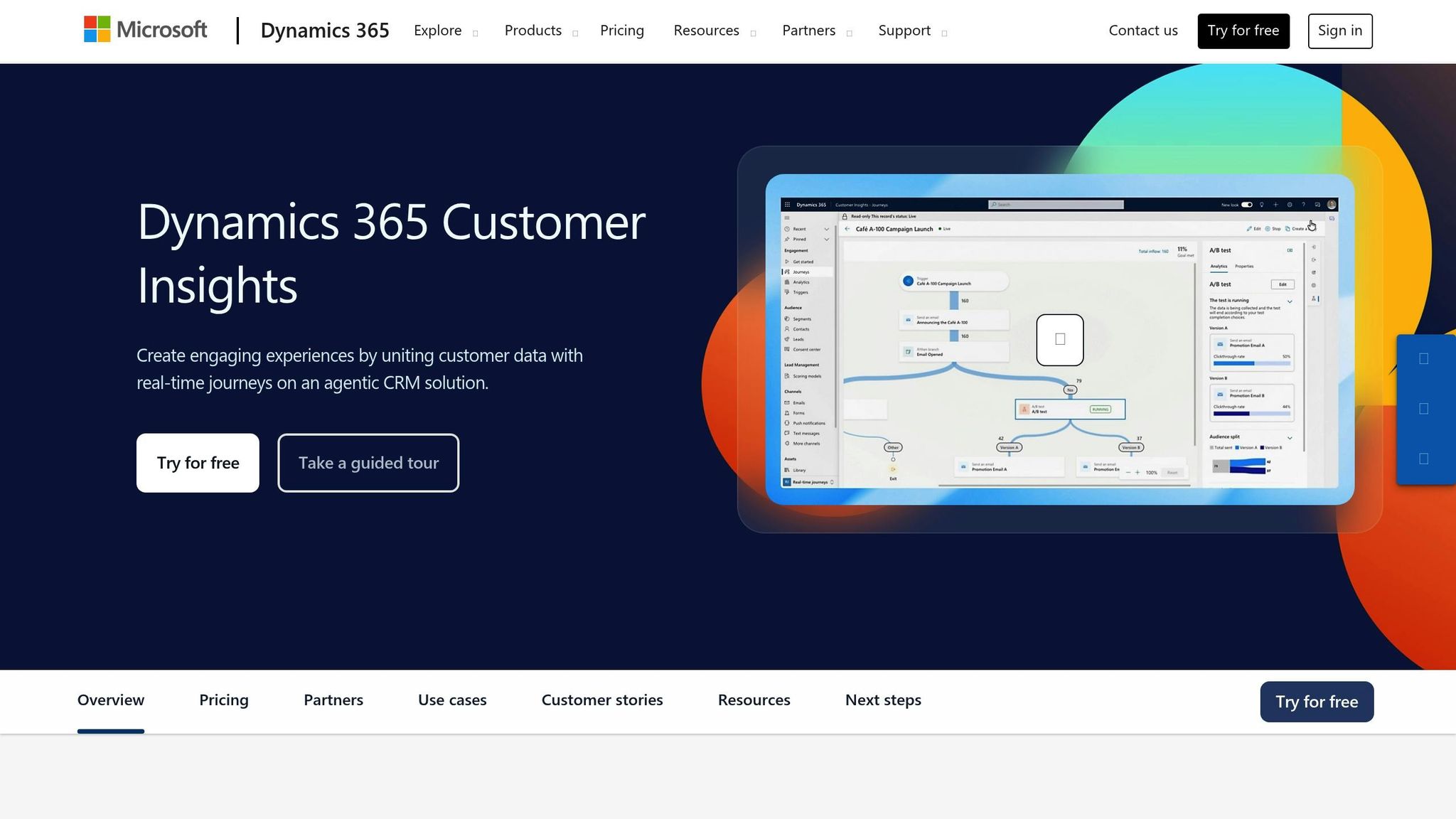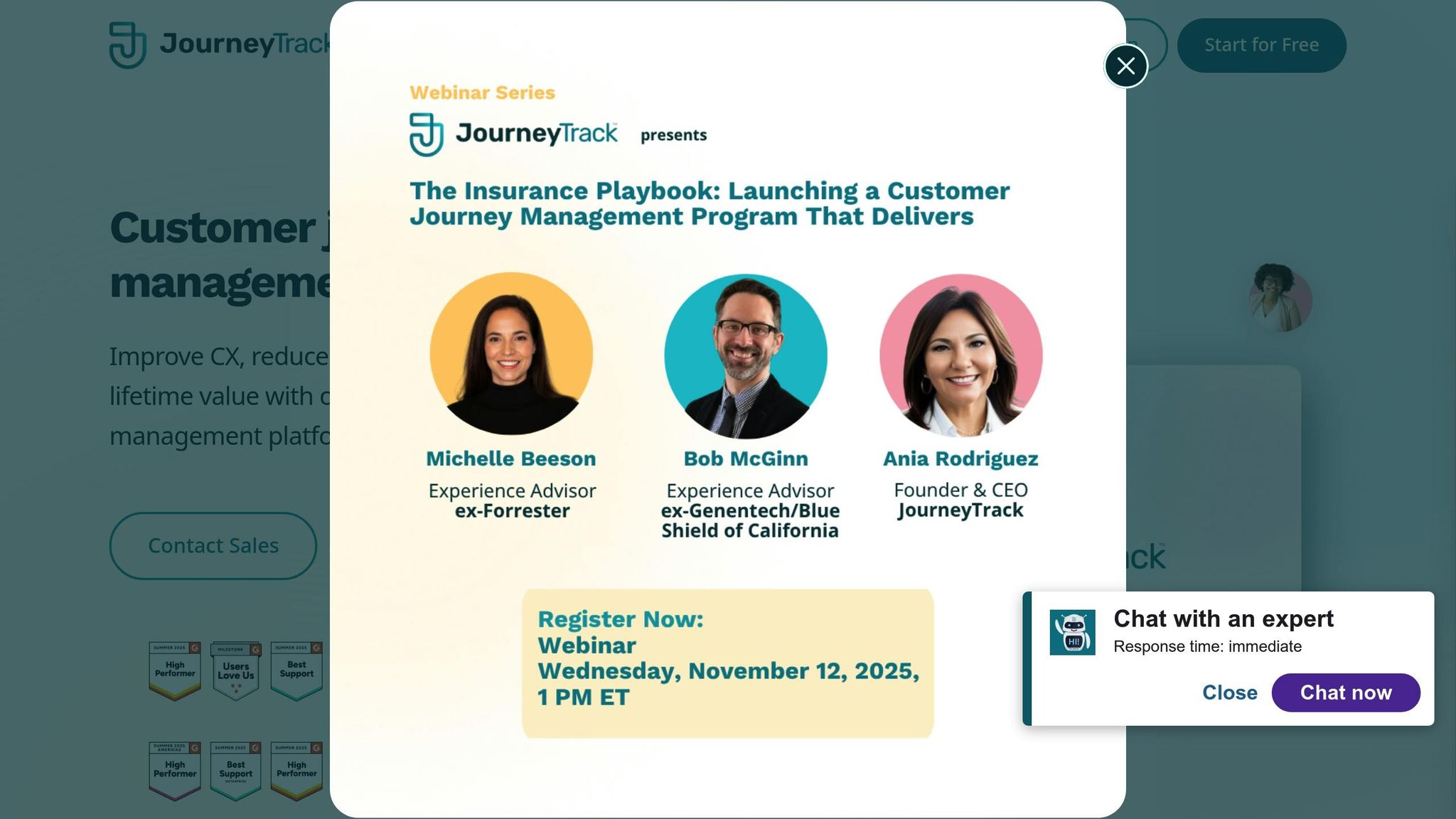Blog / Top Tools for Predictive Customer Journey Analytics
Top Tools for Predictive Customer Journey Analytics
Predictive customer journey analytics is transforming how businesses anticipate customer behaviour. By leveraging AI and machine learning, these tools help forecast actions, reduce churn, and personalise experiences across multiple touchpoints like websites, CRM systems, and social media. This approach is particularly impactful in the UAE, where seamless, customised interactions are highly valued.
Here’s a quick overview of the top tools for businesses in the UAE:
- Wick: Offers a complete digital marketing ecosystem with a focus on Gulf markets.
- Quantum Metric: Uses Felix AI to analyse customer friction points in real time.
- Cxomni: Provides AI-driven segmentation and GDPR-compliant analytics.
- Microsoft Dynamics 365 Customer Insights: Integrates with Microsoft tools to automate personalised campaigns.
- JourneyTrack: Visualises customer journeys with AI-powered recommendations.
Key Features to Look For:
- AI and Machine Learning: Tools must predict behaviour accurately and adapt to your industry needs.
- Real-Time Data Processing: Immediate insights to act on customer behaviour as it happens.
- Integration and Scalability: Compatibility with your existing systems and ability to grow with your business.
Pricing Comparison:
- Cxomni: AED 3,600/month.
- JourneyTrack: AED 88,000/year (Starter) to AED 167,000/year (Professional).
- Wick, Quantum Metric, Dynamics 365: Custom pricing based on business needs.
UAE-Specific Considerations:
- Tools should support Arabic, AED currency, and local data privacy laws like PDPL.
Choosing the right tool depends on your business size, existing systems, and data complexity. For smaller businesses, Cxomni is affordable and scalable. Larger enterprises may benefit from JourneyTrack or Quantum Metric for their advanced features. Wick is ideal for businesses seeking Gulf-specific strategies.
Quick Comparison:
| Tool | Starting Price (AED) | AI Capabilities | Real-Time Analytics | Best Suited For |
|---|---|---|---|---|
| Wick | Custom | Four Pillar AI | Custom implementation | Gulf-focused digital transformation |
| Quantum Metric | Custom | Felix AI session analysis | Yes | Large-scale behavioural insights |
| Cxomni | 3,600/month | Machine learning | Yes | Mid-sized, GDPR-compliant businesses |
| Dynamics 365 | Custom | AI predictions | Yes | Enterprises using Microsoft tools |
| JourneyTrack | 88,000/year | AI-driven recommendations | Yes | Collaborative, large-scale organisations |
This guide simplifies your decision-making, helping you align the right tool with your business goals in the UAE market.
Customer Journey Analytics: Steps to Mastering Next-Gen Techniques | Analytics Nexus 2020
Key Features to Evaluate in Predictive Analytics Tools
Choosing the right predictive analytics tool can make all the difference in understanding and anticipating customer behaviour. The goal is to find a platform that not only enhances your forecasting capabilities but also transforms your marketing approach from reactive to proactive. By focusing on the right features, you can ensure your investment delivers meaningful insights while staying user-friendly for your team.
AI and Machine Learning Capabilities
AI and machine learning are at the heart of effective predictive analytics. These tools rely on sophisticated algorithms to analyse historical data and predict customer behaviour. For example:
Quantum Metric's Felix AI uses generative AI to summarise user sessions, uncovering crucial patterns in customer journeys.
This level of analysis goes beyond surface-level reporting, identifying trends that might escape human observation.
Similarly, Google Analytics 4 employs AI-powered insights to automatically detect trends and patterns in customer data.
These systems continuously learn and improve as they process more data, enhancing their predictions over time. When evaluating AI capabilities, it’s important to consider how well a tool can adapt to your specific industry and handle your unique data. Platforms like Cxomni offer dashboards that use machine learning to forecast trends, delivering actionable insights tailored to your business needs.
The best tools don’t just collect data - they turn it into actionable intelligence. Features like dynamic audience segmentation and personalised recommendations based on predicted behaviour are game-changers. Tools that also enable real-time data processing take this a step further, allowing you to act on insights immediately.
Real-Time Data Processing
Real-time data processing sets advanced tools apart from basic analytics platforms. This feature allows businesses to respond to customer actions as they happen, rather than missing opportunities due to delayed insights.
Cxomni exemplifies this with its real-time analytics, enabling businesses to react swiftly to changing customer behaviours.
This capability is especially valuable for addressing time-sensitive scenarios, such as cart abandonment or customer support needs. The ability to process data from multiple touchpoints - websites, apps, email campaigns, and social media - at once provides a unified, real-time view of customer interactions.
For businesses in the UAE, managing customer experiences across different time zones and cultural contexts adds another layer of complexity. A robust tool should handle peak traffic periods and maintain consistent performance, regardless of data volume fluctuations. Additionally, platforms that trigger automated responses based on real-time insights can significantly enhance customer engagement. For instance, personalised offers or outreach can be initiated instantly when certain behavioural patterns are detected.
Integration and Scalability
A tool’s ability to integrate seamlessly with your existing systems is crucial. Without smooth integration, even the most advanced analytics features can fall short.
Microsoft Dynamics 365 Customer Insights showcases excellent integration by working seamlessly with other Microsoft products, ensuring efficient data flow and coordinated actions across platforms.
This kind of integration ensures predictive insights are immediately actionable, enhancing campaigns, personalisation, and customer service efforts. When evaluating tools, check their compatibility with your CRM, email marketing software, advertising platforms, and customer service systems. The goal is to create a unified ecosystem where predictive insights enhance every aspect of the customer journey.
Scalability is equally important as your business grows. The tool should handle increasing data volumes, additional data sources, and more complex analyses without losing performance. JourneyTrack, for instance, offers scalable solutions, although it requires significant investment and onboarding.
| Feature Category | Key Evaluation Criteria | Impact on Results |
|---|---|---|
| AI Capabilities | Algorithm sophistication, learning speed, prediction accuracy | Higher conversion rates, better personalisation |
| Real-Time Processing | Data speed, automated triggers, multi-channel analysis | Immediate responses, reduced churn |
| Integration | API availability, system compatibility, data flow efficiency | Unified customer experience, streamlined operations |
Another key consideration is data privacy compliance, especially in the UAE market. Ensure the platform supports GDPR-compliant data management, as demonstrated by tools like Cxomni. This protects your business from regulatory challenges while maintaining customer trust.
Finally, look for tools with flexible pricing options that align with your growth plans. Intuitive interfaces and customisable dashboards are also essential to ensure the platform fits seamlessly into your team’s workflow and reporting needs.
Top 5 Predictive Customer Journey Analytics Tools
Choosing the right predictive analytics tool involves weighing features, pricing, and how well it aligns with regional needs. If you're a marketing professional in the UAE, these five platforms offer powerful solutions to enhance your customer journey insights. Each tool stands out for its AI-driven capabilities, real-time data analysis, and smooth integration into existing systems. Here's a closer look at what makes them effective.
Wick

Wick offers predictive customer journey analytics through its Four Pillar Framework, which integrates advanced analytics with strategic execution.
- Build & Fill: Covers website development, content creation, and social media management.
- Plan & Promote: Focuses on SEO strategies and advertising campaigns.
- Capture & Store: Utilises Customer Data Platform (CDP) solutions for behavioural tracking and journey mapping.
- Tailor & Automate: Leverages AI for personalisation and automation to drive growth without losing the human touch.
Wick takes a comprehensive approach, unifying all aspects of digital marketing while delivering predictive insights across customer touchpoints. The company has a strong record of success in the Gulf region, managing digital ecosystems for brands like Baladna in Qatar, Forex UAE, and Hanro Gulf in the UAE. Its ability to localise strategies for Gulf markets highlights its deep understanding of the region.
"Overall, I highly recommend Wick and MB to any business looking for a reliable and effective digital marketing partner. Their expertise, creativity, and dedication to delivering results are truly impressive." - Adelso Quijada, Head of Marketing GCC, Al Marai
Pricing: Customised based on project scope and requirements.
Best for: Mid-to-large businesses aiming for a complete digital transformation and requiring tailored strategies for Gulf markets.
Quantum Metric

Quantum Metric uses its Felix AI system to analyse friction points in customer journeys. This generative AI technology summarises user sessions and identifies behavioural patterns that would otherwise take weeks to uncover.
The platform integrates behavioural data with offline sources like loyalty programmes and contact centres, offering detailed insights through session replays and pre-built dashboards. For UAE businesses managing complex, omnichannel interactions, Quantum Metric's ability to capture real-time data is particularly valuable.
Pricing: Custom enterprise pricing.
Best for: Large organisations with intricate customer journeys needing detailed behavioural analysis.
Cxomni

Cxomni excels in predictive analytics with its customer segmentation engine, which automatically groups users by behaviour and engagement. Its machine-learning dashboard forecasts trends and delivers real-time analytics across multiple channels.
The platform consolidates digital and physical interactions, catering to the UAE's mobile-first audience. It also complies with GDPR, making it ideal for businesses with international customers. However, some advanced features are still in beta, and workflow customisation might be limited compared to larger platforms.
Pricing: AED 3,600/month, with enterprise plans available.
Best for: Mid-sized businesses focused on real-time analytics and GDPR compliance, especially those serving diverse, global audiences.
Microsoft Dynamics 365 Customer Insights

Microsoft Dynamics 365 Customer Insights combines a robust customer data platform with real-time journey management. It integrates data from purchase history, website behaviour, demographics, and more to create comprehensive customer profiles.
AI predictions help marketers anticipate customer needs and automate personalised campaigns triggered in real-time. With seamless integration into Azure and other Microsoft tools, this solution is especially appealing to UAE enterprises already using the Microsoft ecosystem.
Pricing: Customised per organisation, available through consultation.
Best for: Large businesses within the Microsoft ecosystem seeking advanced analytics and automation.
JourneyTrack

JourneyTrack stands out for its AI-powered Journey Atlas, which visualises complex customer pathways and offers automated recommendations. It centralises insights for data-driven decision-making and includes workshop modules for collaborative journey mapping. DEI (Diversity, Equity, and Inclusion) personas further enhance customer understanding.
While its AI tools focus on high-impact areas, the platform requires significant onboarding and may have a steep learning curve for advanced features.
Pricing: AED 88,000/year for the Starter plan, AED 167,000/year for Professional.
Best for: Large organisations prioritising collaborative journey mapping and able to invest in comprehensive analytics tools.
| Tool | Starting Price (AED) | AI Capabilities | Real-Time Analytics | Best Suited For |
|---|---|---|---|---|
| Wick | Custom | Yes (integrated services) | Custom implementation | Digital ecosystem transformation |
| Quantum Metric | Custom | Felix AI | Yes | Enterprise-level behavioural analysis |
| Cxomni | 3,600/month | Machine learning | Yes | GDPR-compliant mid-market solutions |
| Dynamics 365 | Custom | AI predictions | Yes | Microsoft ecosystem users |
| JourneyTrack | 88,000/year | Journey Atlas AI | Yes | Collaborative, large-scale organisations |
Feature and Pricing Comparison
When choosing a tool for your UAE business, it’s important to weigh the features and pricing of each option carefully. Building on earlier discussions about AI and real-time processing, here’s a closer look at pricing and functionality.
Pricing varies widely between tools. Cxomni starts at AED 3,600/month, making it a good choice for mid-sized businesses exploring predictive analytics. On the other hand, JourneyTrack requires an annual commitment, with prices ranging from AED 88,000 (Starter) to AED 167,000 (Professional).
For enterprise solutions like Quantum Metric, Microsoft Dynamics 365, and Wick, pricing is customised to fit specific business needs. Notably, Microsoft Dynamics 365 offers unlimited user access, which is particularly useful for UAE companies looking to manage costs as their teams grow. The table below provides a quick comparison of these tools.
| Tool | Starting Price (AED) | AI Capabilities | Real-Time Analytics | Multi-Channel Tracking | Integration Options | Optimal Business Size |
|---|---|---|---|---|---|---|
| Wick | Custom | Four Pillar AI integration | Custom implementation | Unified digital ecosystem | CDP and marketing platforms | All sizes (scalable) |
| Quantum Metric | Custom | Felix AI session analysis | Yes | Online/offline unification | CRM and analytics systems | Medium to large |
| Cxomni | AED 3,600/month | Machine learning forecasting | Yes | Digital and physical touchpoints | Enterprise tools; GDPR-compliant | Medium to large |
| Microsoft Dynamics 365 | Custom | AI predictions and automation | Yes | Purchase, web, demographic data | Azure, Power Platform, Microsoft apps | Large enterprises |
| JourneyTrack | AED 88,000/year | AI-driven recommendations | Yes | Multi-channel feedback aggregation | Behavioural data sources | Enterprise-level |
Comparing AI Capabilities
The level of AI sophistication differs across platforms. Quantum Metric’s Felix AI accelerates analysis by processing vast behavioural data sets instantly, turning weeks of manual work into actionable insights. Cxomni leverages machine learning to predict customer behaviour and automate segmentation. Meanwhile, JourneyTrack uses AI to suggest and prioritise journey improvements, and Microsoft Dynamics 365 focuses on predicting the next best customer actions.
Real-Time Processing
All these tools offer real-time analytics, though their approaches vary. Quantum Metric excels in instant journey visualisation and friction detection. Microsoft Dynamics 365 enables real-time campaign triggers based on live data, while Cxomni provides dynamic insights for immediate trend spotting - an essential feature in the fast-paced UAE market.
Integration Options
Integration flexibility is crucial, especially for UAE businesses with existing tech ecosystems. Microsoft Dynamics 365 integrates seamlessly with Azure and other Microsoft apps. Quantum Metric combines behavioural data with offline sources like loyalty programmes and contact centres, supporting omnichannel retail environments. Similarly, Cxomni ensures GDPR-compliant data management, which is vital for businesses serving international customers.
Business Size and Scalability
The size of your business plays a major role in tool selection. JourneyTrack’s higher annual cost of AED 88,000 makes it more suitable for large enterprises with bigger analytics budgets. Cxomni’s monthly pricing is better suited to growing businesses, while Microsoft Dynamics 365’s unlimited user access is ideal for large teams. Wick, with its consultancy approach, adapts to businesses of all sizes, offering scalable solutions for startups and enterprises alike.
Hidden Costs and Local Considerations
When budgeting, keep an eye out for hidden costs. For instance, JourneyTrack may require extensive onboarding to fully utilise its features, and Cxomni may need customisation for non-standard workflows, potentially increasing costs. While enterprise solutions often include implementation, training, and support, the quality of these services can vary in the UAE market.
For UAE businesses, pricing in AED provides more stability compared to tools priced in USD, which are subject to exchange rate fluctuations. Always confirm whether VAT is included and check for local support availability. These factors can significantly impact the total cost of ownership for businesses operating in the UAE.
sbb-itb-058f46d
How to Choose the Right Tool for Your Business
Picking the right predictive customer journey analytics tool is more than just comparing features and prices. It’s about finding a solution that fits your business’s current needs and future goals. Factors like the size of your organisation, existing systems, and regional requirements all play a role in making the right choice.
Business size shapes your tool needs. For small to medium-sized enterprises, Cxomni’s monthly pricing at AED 3,600 offers an affordable way to explore predictive analytics without heavy upfront costs. In contrast, fast-growing companies may prefer platforms like Microsoft Dynamics 365 Customer Insights, which provide unlimited user access, eliminating concerns about increasing per-seat costs as your team expands. Larger enterprises often require tools like Quantum Metric or JourneyTrack, which are built to handle high data volumes across multiple touchpoints while offering advanced security features.
Your existing tech setup matters. If your business already uses Microsoft tools, Dynamics 365 is a natural choice, offering seamless integration with Azure, Power Platform, and other Microsoft applications. However, for companies relying on various digital platforms, Quantum Metric stands out by integrating behavioural data with offline sources like loyalty programmes and contact centres, creating a holistic view of customer interactions.
Regional factors are crucial for UAE businesses. Tools should support Arabic interfaces and comply with local data sovereignty regulations. Multi-language capabilities and regional customisation options are vital, given the nuances of customer experience in the region. Additionally, tools must integrate with local payment gateways and handle multi-currency transactions (e.g., AED, SAR, KWD, QAR) for businesses operating across the GCC. Wick’s Four Pillar Framework provides technical guidance to help businesses integrate these tools into their digital ecosystems.
Team expertise influences implementation success. Platforms like JourneyTrack often have steep learning curves, requiring dedicated onboarding. If your team lacks advanced analytics experience, consider tools with robust support systems or access to consultancy services to ensure a smooth transition.
Data complexity impacts platform choice. Unifying data from multiple touchpoints is essential for effective predictive analytics. Businesses with straightforward customer journeys might find Cxomni’s machine learning forecasting and automated segmentation adequate. On the other hand, companies managing complex omnichannel operations will benefit from Quantum Metric’s Felix AI, which can process large datasets quickly, turning manual analysis into actionable insights.
Consider additional costs beyond subscriptions. Budget for onboarding, training, and optimisation expenses. Check for VAT inclusion, local support availability, and currency stability to ensure your solution remains cost-effective in the UAE market.
Scalability should align with your growth plans. JourneyTrack’s tiered plans range from 50 journey maps in the Starter plan to unlimited maps in the Enterprise option, so it’s important to project your future needs accurately. For companies undergoing rapid digital transformation, platforms like Microsoft Dynamics 365 or Quantum Metric are designed to scale with enterprise-level operations.
Security and compliance are non-negotiable. UAE financial institutions, healthcare providers, and government entities require stringent standards like ISO 27001 certification and SOC 2 compliance. Tools like Cxomni, which support GDPR-compliant data management, are ideal for businesses serving international customers. Additionally, ensure the tool offers Middle East-based data centres to comply with local data protection laws and banking requirements.
Implementation Best Practices
Implementing predictive customer journey analytics in the Gulf requires a thoughtful approach, focusing on data integration, compliance with local laws, team training, and continuous improvement.
Start with solid data preparation. Collect data from every customer interaction point, ensuring it adheres to local formats like AED for currency, DD/MM/YYYY for dates, and 24-hour time displays. Clean and deduplicate the data to maintain its quality, and unify formats across all sources for consistency. Wick's Four Pillar Framework highlights the importance of robust data systems, with the consultancy managing over 1 million first-party data points for its clients. Once your data is clean and standardised, the next step is ensuring compliance with UAE-specific privacy regulations.
Compliance with UAE data privacy laws is critical. Adhering to the UAE Personal Data Protection Law (PDPL) ensures that your analytics efforts are both legal and ethical. This law mandates clear customer consent for data collection and secure storage within approved jurisdictions. Configure your analytics platform to align with these requirements, and conduct regular compliance audits. If you’re using international tools like Microsoft Dynamics 365 Customer Insights or Quantum Metric, confirm that their cloud providers meet UAE data protection standards. Updating privacy policies to reflect analytics usage is also essential.
Train your team with a focus on both technical skills and regional nuances. Offer bilingual, hands-on workshops to cover platform features, ensuring materials are available in both English and Arabic to accommodate the Gulf’s multilingual business environment. Local consultancies like Wick can enhance adoption by tailoring training to regional practices and regulatory requirements. Once the team is trained, roll out the tool gradually to test its effectiveness.
Use a phased rollout to minimise disruptions. Start with a pilot project targeting one customer journey or business unit. This approach helps fine-tune data integration and measure the tool’s impact before scaling. For example, a major UAE retailer successfully implemented Quantum Metric by starting with online customer data before linking offline touchpoints. Within six months, they achieved an 18% reduction in cart abandonment rates and a 12% boost in conversion rates.
Define KPIs that align with regional business dynamics. While standard metrics like conversion rates and Net Promoter Scores are important, include region-specific indicators as well. For instance, track customer engagement during Ramadan, Eid, and other local holidays when buying behaviours shift. Report all metrics in AED, using local number formats (e.g., 1,000.50) to ensure consistency with existing business reports.
Address common challenges during implementation. Data silos are often a significant obstacle. Regular cross-departmental meetings can align goals and dismantle organisational barriers. The shortage of skilled analytics professionals in the region can be mitigated by partnering with local experts or investing in comprehensive training programmes. Establish clear data governance policies that comply with UAE regulations and support your analytics objectives.
Adapt platforms for local market needs. Ensure dashboards display currency in AED and offer Arabic language support where necessary. For companies serving the broader GCC region, choose tools that handle multi-currency transactions, including AED, SAR, KWD, and QAR.
Plan for ongoing maintenance and optimisation. Implementation doesn’t stop at deployment. Set up role-based access controls, encrypt sensitive data, and provide regular privacy training for your staff. Continuously monitor the platform’s performance and make adjustments as business needs change. This ongoing effort strengthens the predictive insights that drive marketing success. Consulting local legal advisors can help you stay compliant as UAE regulations evolve.
Budget for the full scope of implementation. Factor in costs for onboarding, training, and ongoing optimisation. Be sure to account for VAT in pricing and consider currency stability for long-term planning. For example, tools like Cxomni, at AED 3,633 per month, offer predictable costs for smaller setups, while larger enterprise solutions require a bigger upfront investment but allow for greater scalability.
Success in predictive analytics hinges on careful preparation, respect for local regulations, and a commitment to continuous improvement. By adopting these best practices and leveraging regional expertise, Gulf businesses can maximise their analytics investments while staying compliant with local laws.
Conclusion
Predictive analytics is reshaping the marketing landscape in the UAE, offering businesses the tools to anticipate customer needs, address pain points, and craft personalised experiences that resonate with today's market demands. By proactively tackling challenges and optimising marketing spend, these solutions not only boost revenue but also strengthen brand loyalty - key priorities for companies in the UAE.
The tools explored here - ranging from Wick’s unified digital strategies and Quantum Metric’s real-time AI insights to Cxomni’s multi-channel tracking, Dynamics 365’s seamless integration, and JourneyTrack’s collaborative mapping - each bring unique strengths to the table. The next step is to ensure these tools are integrated effectively into your marketing framework, aligning with your specific business goals.
When choosing a solution, it’s essential to consider local needs, such as AED currency formats, DD/MM/YYYY date standards, and compliance with UAE data privacy laws. A successful implementation goes beyond using predictive analytics as a standalone tool; it requires embedding it into a cohesive digital marketing strategy. This approach eliminates fragmented efforts and ensures a seamless experience across all customer interactions. Begin with a pilot project targeting high-impact areas, monitor the outcomes, and expand based on measurable success.
These tools not only offer immediate benefits but also lay the groundwork for sustained competitive advantage. By 2025, AI-driven predictive analytics will redefine customer experiences, enabling businesses to anticipate and optimise every interaction. Companies in the UAE that act now - prioritising localisation and compliance - will position themselves as leaders in delivering personalised experiences that foster deep customer loyalty and sustainable growth.
For additional support, consider working with local experts like Wick, who specialise in unified digital marketing strategies tailored to the UAE market. Their understanding of regional nuances and regulatory requirements can help you maximise your investment while maintaining cultural relevance. The ability to predict and respond to customer needs before they are voiced is no longer a distant goal - these tools make it a reality today.
FAQs
What should I look for in a predictive customer journey analytics tool for my business in the UAE?
When choosing a predictive customer journey analytics tool for your UAE business, prioritise features that match your objectives and cater to the local market. Opt for tools that offer AI-powered insights, smooth integration with your current systems, and real-time data analysis. These capabilities can help you gain a deeper understanding of customer behaviour and fine-tune their journey effectively.
Wick's Four Pillar Framework provides a well-rounded digital marketing strategy by combining website development, SEO, content creation, social media management, marketing automation, and advanced analytics. This integrated approach empowers your business to deliver personalised, data-driven experiences, paving the way for sustainable growth in the UAE's competitive market.
How do the predictive analytics tools featured in the article ensure compliance with UAE data privacy regulations?
The tools discussed in the article are built with a strong focus on data privacy and are designed to comply with UAE regulations, including the UAE Personal Data Protection Law (PDPL). Key features like data encryption, user consent management, and secure data storage are typically integrated to meet these compliance requirements.
Although the article highlights Wick's expertise, it’s important to recognise that their approach to data analytics goes beyond just effectiveness. They ensure that all strategies are developed in line with local regulations, maintaining both efficiency and compliance with UAE standards.
Are these predictive analytics tools compatible with my current systems and capable of growing with my business?
Wick's Four Pillar Framework is built to work effortlessly with your existing digital systems, creating a cohesive method for analysing customer journeys. By bringing together insights like behavioural tracking and journey mapping, it enables businesses to make informed decisions that align with their specific goals.
This flexible model not only aligns with your current operations but also evolves alongside your business, ensuring long-term success in an ever-changing market.
